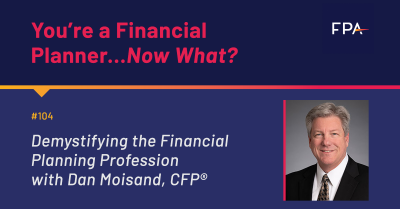
There’s a lot of terms within the financial planning profession and today’s episode looks to bring clarity to some commonly misunderstood terms. From the difference between an RIA and a Broker Dealer, to the different fee structures and even understanding what it means to be an investor, there are so many different terms thrown around. These terms can be confusing, but it’s critical that planners understand what each of them mean as they navigate the profession, their careers and most importantly capture who they are and what they do.
In this episode, Dan Moisand, former President of the FPA, sits down with your host Hannah Moore to talk through the technical definitions that comprise this profession. We’re really getting in the weeds with it here - and this episode will act as a primer for all new planners entering the financial services industry.
Dan also guides new planners in how they can move beyond these technical definitions to move our wonderful profession forward.
This is a must-listen for all new planners who are looking to decipher the difference between marketing terms and ways that the financial planning profession is actually regulated by our governing bodies!
What You’ll Learn:
- The difference between a RIA and a Broker Dealer
- What a “Wirehouse” is - and what you need to know about them as a new planner
- What a “Custodian” is
- The difference between a Financial Planner and an Advisor
- The difference between an Agent and a Broker
- Why “Wealth Management” is technically a marketing term
- What “Financial Planning” actually is
- The difference between Discretion and Non-Discretion
- What the Fiduciary vs. Suitability debate is all about, and what the difference is for consumers and planners
- What the different career paths for new planners are (paraplanner vs. associate planner vs. junior planner), and how to know what you’re applying for
- What the SEC proposed versus DOL fiduciary rules
- What it means to be an investor
- What the difference between a trader and a speculator is
- How you, as a new planner, can help to move the profession forward in spite of the technical jargon
- How to communicate with clients about the technical titles in the profession
- Why you need to know these technical terms